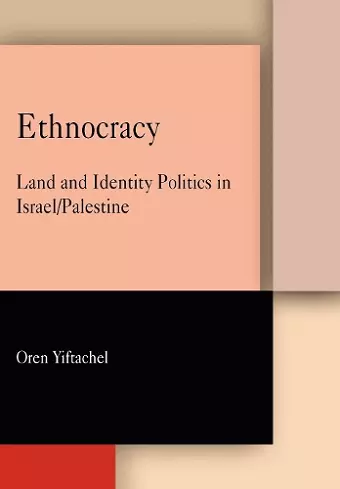Ethnocracy
Land and Identity Politics in Israel/Palestine
Format:Paperback
Publisher:University of Pennsylvania Press
Published:27th Aug '24
Should be back in stock very soon

For Oren Yiftachel, the notion of ethnocracy suggests a political regime that facilitates expansion and control by a dominant ethnicity in contested lands. Ethnocracy traces the dynamics of territorial and ethnic conflicts between Jews and Palestinians and examines the consequences of settlement, land, development, and planning policies.
Traces the dynamics of territorial and ethnic conflicts between Jews and Palestinians
For Oren Yiftachel, the notion of ethnocracy suggests a political regime that facilitates expansion and control by a dominant ethnicity in contested lands. It is neither democratic nor authoritarian, with rights and capabilities depending primarily on ethnic origin and geographic location. In Ethnocracy: Land and Identity Politics in Israel/Palestine, he presents a new critical theory and comparative framework to account for the political geography of ethnocratic societies.
According to Yiftachel, the primary manifestation of ethnocracy in Israel/Palestine has been a concerted strategy by the state of "Judaization." Yiftachel's book argues that ethnic relations—both between Jews and Palestinians, and among ethno-classes within each nation—have been shaped by the diverse aspects of the Judaization project and by resistance to that dynamic. Special place is devoted to the analysis of ethnically mixed cities and to the impact of Jewish immigration and settlement on collective identities.
Tracing the dynamics of territorial and ethnic conflicts between Jews and Palestinians, Yiftachel examines the consequences of settlement, land, development, and planning policies. He assesses Israel's recent partial liberalization and the emergence of what he deems a "creeping apartheid" whereby increasingly impregnable ethnic, geographic, and economic barriers develop between groups vying for recognition, power, and resources. The book ends with an exploration of future scenarios, including the introduction of new agendas, such as binationalism and multiculturalism.
"Yiftachel's admirable work attempts both to characterise the nature of the Israeli state and to draw moral implications from such characterisation. On the basis of his analysis Yiftachel offers his vision for what he and many others refer to as 'Israel-Palestine'. Yiftachel asks, and attempts to answer, two interrelated questions: first, 'what kind of a polity is the state of Israel?', and second, 'what kind of a society is Israli society?' Conventional wisdom would answer both questions with the word 'democratic'. However, Yiftachel's book masterfully challenges such an answer. His claim is that the state of Israel, uncritically dubbed as 'Jewish-democratic', belongs to a group of states that ought to be referred to as 'ethnocracies'. Israeli society is also an ethnocratic society." * Holy Land Studies *
"A thoughtful, humane, and arresting book. . . . It ranges widely, contributing to a number of discussions in political geography, political sociology, and planning." * Planning Theory *
"An important book that adds the often neglected angle of political geography to the growing body of critical research on the Israeli state and society, and on the Jewish-Arab conflict." * Baruch Kimmerling, The Hebrew University of Jerusalem *
ISBN: 9781512826852
Dimensions: unknown
Weight: unknown
364 pages